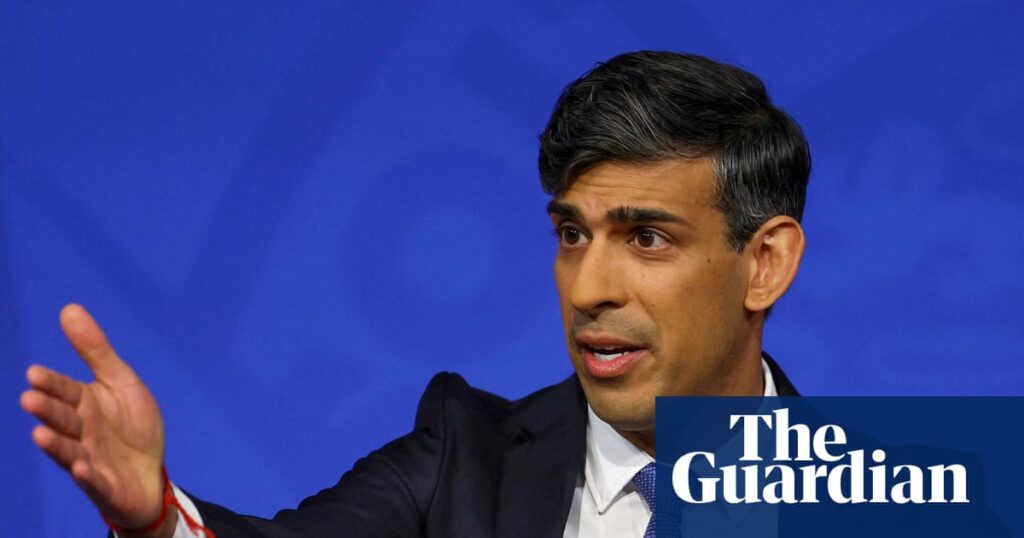Rishi Sunak was the only politician to be sent a witness statement by the deputy national security adviser at the centre of a controversy about the collapse of a case against two British men accused of spying for China.
According to letters sent to the joint committee on the national security strategy, the statement from Matthew Collins in December 2023, which was sent to the then prime minister and his advisers, did not describe China as an enemy, another key element of the case.
The letters also set out that by this point, the start of the prosecution process, police and prosecutors were told that Collins would not call China an enemy as this was not the policy of the then Conservative government.
The case against the men, Christopher Cash and Christopher Berry, was dropped in September after prosecutors concluded that a conviction under the Official Secrets Act was not realistic without government evidence China posed a threat to the UK’s national security. Both Cash and Berry have consistently denied any wrongdoing.
The Conservatives have challenged Keir Starmer repeatedly about what he and his advisers knew about the case, and whether the prime minister or others intervened so as to avoid a potential row with China.
But the letters published on Friday by the joint committee, which is holding an inquiry into the affair, set out that once the formal prosecution case had begun, no politicians were involved, meaning it was only Sunak who was sent Collins’s statement.
Speaking after the letters were released, Starmer’s press secretary said the Conservatives had “serious questions to answer” about their role in the affair following “weeks of baseless allegations”.
However, a source close to Sunak said the former PM had checked with the Cabinet Office and found there was no record of Collins’s statement being put in his prime ministerial box, meaning he would not have seen it personally.
In a letter to Matt Western, the Labour MP who chairs the joint committee, Collins and Jonathan Powell, the national security adviser, set out that a first draft of Collins’s witness statement was sent to Sunak’s office in December 2023, “to also be shared with No 10 special advisers”.
By this point, the letter said, a description of China as an “enemy” initially included in a draft had been removed by Collins “as it did not reflect government policy”.
This fact was passed on to police and the Crown Prosecution Service (CPS), Powell and Collins said in their letter, and added: “We understand from CTP [counter-terrorism police] that the CPS were aware of this in December 2023, which was before charges were brought.”
The letter reiterated the insistence of Starmer’s government that it had nothing to do with the collapse of the case and did not see subsequent statements requested from Collins by prosecutors, produced after the change of government.
“Following the submission of the first DNSA [deputy national security adviser] witness statement to CTP, no minister or special adviser (including the current NSA) played any role in the provision of evidence. The DNSA understood from lawyers that following the charging decision, his witness statement could not be shared,” the letter set out.
Later, the committee published a letter from Stephen Parkinson, the director of public prosecutions, whose role has come under increasing scrutiny.
after newsletter promotion
Answering a series of detailed questions, Parkinson set out how the threshold for securing a conviction under the Official Secrets Act had changed following a separate trial of six Bulgarian nationals found guilty of spying for Russia, which saw legal challenges based on whether a country to which information was passed had to be an “enemy”.
Parkinson said that after discussions with Collins, it became clear that he would not describe China as “an active threat to national security” because that was not, Collins said, government policy.
The furthest Collins would go was “active espionage threat”, Parkinson wrote, and that in the end this was seen as not enough for a conviction.
This was, he said, all connected to the situation under the Conservatives, when the charges were brought: “The position of the current government was not relevant to the case.”
In another letter to the committee also published on Friday, the attorney general, Richard Hermer, said he had played no role in the case beyond getting a “brief update” from prosecutors in August, and being told the next month that the case was being dropped.
“Consent [for prosecution] was given by my predecessors on 3 April 2024. Following that date, no law officer intervened in the case at any stage,” he wrote.
Starmer and his ministers have argued that the trial would not have had to be abandoned if the Conservatives had been speedier in replacing the Official Secrets Act, which dated from 1911. It has since been replaced with the National Security Act.


